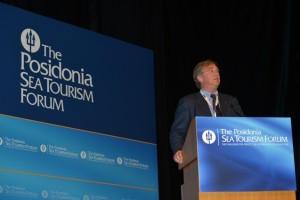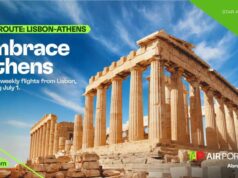Further dialogue among stakeholders needed to overcome hurdles to growth
 CLIA Europe, the association representing the 40 billion euro cruise industry in Europe, stressed the need for greater cooperation among all stakeholders in order to unlock the potential of the cruise industry in Greece, at this year’s Posidonia Sea Tourism Forum taking place on 26-27 May in Piraeus, Greece.
CLIA Europe, the association representing the 40 billion euro cruise industry in Europe, stressed the need for greater cooperation among all stakeholders in order to unlock the potential of the cruise industry in Greece, at this year’s Posidonia Sea Tourism Forum taking place on 26-27 May in Piraeus, Greece.
Pierfrancesco Vago, CLIA Europe’s Chairman and Executive Chairman of MSC cruises, speaking at the event’s Morning Cruise Sessions, highlighted the economic importance and success of the Cruise Industry in Europe and emphasised that Greece, Europe’s third most popular destination, had a big hand in this success.
“Direct cruise industry spending in Greece stands at about 570 million euro, more than a third of which goes on wages for 11,000 Greek jobs. This means Greece is Europe’s seventh biggest beneficiary of direct cruise industry spending. He added, “as a source market, Greece is resurgent, growing by 10% between 2013 and 2014.”
But, while the CLIA Europe Chairman’s message on the impressive economic achievements in Greece was clear, he also added a strong note of caution, “while future growth can be achieved in this country, it is far from guaranteed.”
He added that in order to achieve the full potential of cruising, “the industry needs an operating environment that is competitive, stable, and efficient.” This is due to the fact that “today, there are serious hurdles, which, if ignored, risk leaving that potential forever locked up.”
According to the CLIA Europe Chairman, there are five major hurdles on which progress needs to be made to ensure the European Cruise Industry continues to generate growth and jobs. These can be summarised as follows:
Improving port infrastructure and connections to the hinterland, helping the regional economy and enhancing the experiences on offer;
A transparent and publicly available berth allocation system, ensuring safe operation and enjoyable passenger experiences;
Avoiding sudden, ambush increases in sightseeing fees, leading to unforeseen costs for the Cruise Industry;
Encouraging homeporting in Greece through a stable operating environment, which would benefit significantly the national economy;
Simplify Visa issuance for third-country visitors, helping Europe to remain the number one tourist destination.
Pierfrancesco Vago welcomed efforts to tackle the hurdles he identified, saying that “the Greek Government took a very important step towards solving some of these issues by announcing the creation of a new cruise coordinating body. This has been a key demand of CLIA Europe to the Greek authorities.”
Echoing the CLIA Europe Chairman’s sentiments, Kyriakos Anastassiadis, CEO of Celestyal Cruises and member of CLIA Europe’s Executive Committee, stressed the importance of long-term stakeholder involvement, saying that “the cruise industry is totally committed to finding a way forward and will continue to work with all stakeholders in a constructive and determined way to boost the cruise industry and generate work and wealth in Greece and throughout Europe.”
Pierfrancesco Vago concluded on a positive note, “by its nature, Greece is better placed than most to capitalise on the cruise industry’s enormous potential to create growth and jobs.”











